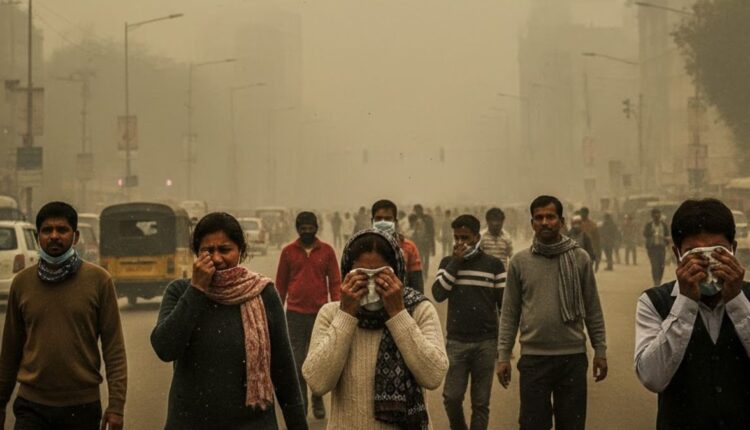Delhi AQI: Every winter, Delhi experiences a sharp surge in pollution levels, with dropping air quality levels. The drop in temperature, combined with calm winds and increased emissions from vehicles, industries, and crop burning in nearby states, traps harmful particles close to the ground, resulting in smog. This seasonal smog along with deteriorating air quality has always been a cause for concern. The toxic smog not only makes it hard to breathe but also irritates the eyes, throat, and lungs, affecting the health of millions of residents.
Delhi AQI: How winter smog is causing dry eyes?
In this article, we have uncovered the hidden link between smog and dry eyes. We have tried to answer why with many residents are noticing more than just coughing or difficulty breathing as Delhi’s air quality worsens and why dry, itchy eyes are becoming common during winters.
The thick smog in the air contains tiny particles called PM2.5 and PM10, which irritate the eyes and reduce tear production, causing dryness and discomfort. These pollutants can also trigger inflammation in the eyes. PM2.5 particles are smaller than 2.5 micrometers and can penetrate deep into the lungs and even enter the bloodstream, whereas, PM10 particles are smaller than 10 micrometers and can irritate the eyes, nose, and throat, causing respiratory problems.
AQI, which stands for Air Quality Index measures how polluted the air is. It combines the concentrations of PM2.5, PM10, and other pollutants like NO₂, SO₂, CO, and O₃ into a single number. The higher the AQI, the worse the air quality as it indicates higher concentration of the above mentioned pollutants. So the dry, itchy eyes you get during the winters, when AQI peaks is a result of these pollutants.
Who is at risk and how to prevent it
People who spend long hours outdoors or commute in traffic-heavy areas are more likely to experience these symptoms. The impact of these tiny particles is such that even wearing glasses or staying indoors doesn’t fully protect.
Experts advise taking precautions during high-smog days which include: avoiding rubbing your eyes, using lubricating eye drops, wearing protective glasses or masks, and reducing outdoor exposure, especially for children, the elderly, and people with pre-existing eye conditions.
Delhi AQI: Doctors warn of health risks
Meanwhile, doctors in Delhi have raised an alarm about the rise in illnesses caused by air pollution. According to Doctors, many people are suffering from various respiratory conditions, including throat irritation, rhinitis, a runny nose, itchy eyes, and severe chest congestion. Dr Pulin Gupta, a PGIMER Professor told ANI, that the OPD is flooded with patients with diseases due to pollution and highlighted that there has been a 22-25 Per cent increase in respiratory illnesses.
“Because of the pollution, the OPD is flooded with patients with respiratory diseases like bronchitis, acute attacks of asthma. Patients are coming to the ENT OPD with sinusitis, runny nose, and bleeding nose. Patients with dermatitis have increased… More patients are coming with dryness, watery eyes, redness of eyes and diminution of vision. In the respiratory clinic, almost 22-25% extra number of patients of all the pollution-related diseases,” he stated.

